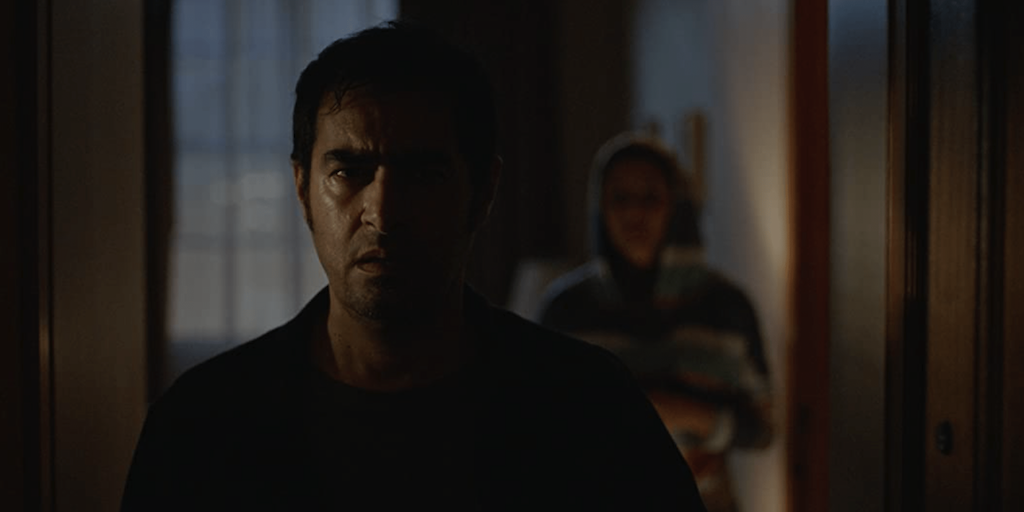Hotel Horror Makes Itself at Home in Kourosh Ahari’s The Night
One of the hard things with horror is sticking the ending. If you explain too much, you suck all the uncanniness out. If you don’t explain anything, it can collapse into meaningless dream logic. Anyone can throw spooky images on a screen, but if it isn’t grounded in anything, it’s not going to scare you.
The Night walks this line very successfully.
We begin with the lovely mundanity of a dinner party. Farhad, a doctor, and Elahe, his wife, are hosting two couples for a game of Mafia, dinner, and a little too much drinking. The kids are playing in the other room, one couple’s one-year-old baby, Shabnam, giggles as she watches them from her crib. But there are clearly cracks showing already. The baby’s mother, Neda, is new to the U.S.—she stayed behind in Iran while her husband Babak lived in the States, and she’s not quite settled yet. There’s also clear tension between the couple. Is it something to do with their years apart? Just the natural stress of new parenthood?
One positive note is that they just got matching tattoos: an arcane arched pattern in complementary spots on their wrists. But, Neda tells the other wives, they don’t even know what the tattoos mean. They just picked the design from the artist’s book.
Couples’ tattoos can be great, of course, but when you’re already on shaky ground, shouldn’t you get something meaningful?
From this beginning the movie quickly drops us into horror. Babak is drunk, Neda is pissed, and their GPS is acting possessed. They’ve already turned down Farhad’s offer to spend the night, and it would be too embarrassing to go back. Which is how they end up at the Hotel Normandie (a real hotel in LA, which I am definitely staying in as soon as possible). Once they’ve checked in, everything goes full Overlook, with creepy sounds, creepy kids, pounded-upon doors opening onto empty hallways, a sense of time expanding and contracting at will, and a creepy bathtub encounter.
If you watch a lot of horror movies, which I do, you’ll probably be able to predict some of the turns the film takes—but The Night is so artfully constructed that any plot expectations you have won’t matter once Babak and Neda get to the hotel.
This is the first U.S.-produced film that’s been approved for Iranian theaters since the 1979 revolution, and most of the dialogue is in Farsi. It was written by Kourosh Ahari and Milad Jarmooz, and directed by Ahari, who also directed a 2016 adaptation of Charlotte Perkins Gilman’s “The Yellow Wallpaper”—the man clearly knows how to trap psychological horror in a suffocating room. Because the action mostly unfolds in either a car or a hotel room, and focuses almost entirely on two adults and a baby, the movie’s success hinges on the use of the space, and the performances of the actors. And this is where The Night becomes really special.

First, Ahari uses the hell out of light and its lack, and he understands the value of deep shadows—always my favorite trait in a horror director. He builds his tension with tight close-ups, and agonizingly slow panning shots, to get at that certainty that I think a lot of us have, that the most terrifying thing in the world is the thing that is just outside your field of vision—you know it’s there, but if you turn your head you’re going to have to face it. Add to that beautifully orchestrated thumps, pipe clangs (at least, I hope they’re pipes), and faucet drips, and a score that veers between “reminiscent of Rosemary’s Baby” to “Omen-but-less-chanty-and-more-doomy” to “oh-shit-it’s-verging-on-Hannibal-now” and in the end the movie becomes a cocoon of dread.
The only way this movie works, though, is if the actors sell it. Shahab Hosseini makes a fantastic choice for Babak early on. Not only does the poor man have a toothache, but he’s just weary–the kind of bone-tired that makes everything an effort. This creates a perfect foundation to build on as the horror sets in, because you get the sense that Babak is questioning his senses long before he gets to the Hotel Normandie. It also gives him an excellent emotional undercurrent as the psychic attacks start, and as we learn more about his secrets and guilt we begin to get clues about the weariness, without every feeling like his character has been explained away.
Niousha Jafarian is a perfect foil as Neda. She begins the film as Exasperated New Mom, nagging Babak about drinking too much, and sublimating all of her own annoyances into “Here’s Why This Is Actually Bad For The Baby.” But as she deals with her own types of horror, she slowly lets herself fall into fear and guilt that has nothing to do with Shabnam. (And speaking of Shabnam, she is played by Leah Oganyan and she may be the cutest baby ever put on screen. I want Shabnam in every movie.) As I said, the film mostly hinges on the core trio, but with haunted hotel must come creepy concierge, and while George Maguire only has a few scenes, he is unbelievably creepy. Without spoiling anything, he has one lengthy monologue that, the more I think about it, is moving steadily up my list of “Great Character Moments in Horror.” His role is perfectly calibrated against Babak and Neda’s increasing sense that Something Is Wrong.
The other thing is that this is the first film I can think of in ages that just gives us regular Iranian people. Babak and Neda are a married couple with deep-seated issues, but those issues have nothing to do with being Iranian immigrants. They’re never targeted onscreen for discrimination or prejudice, and there’s no fetishization of Muslim religious practices. We have no idea if they’re practicing at all, actually. In the opening scene one person chooses not to drink because she’s breastfeeding, and two other characters simply say they don’t drink. There’s no moment, as maybe there would be in a fully American production, where someone has to explain Islam’s stance on liquor. I actually hate bringing this up, because I feel like now I’m doing the thing I’m happy the movie didn’t do? But I also think it’s worth pointing out that where The Babadook was about the societal pressures of motherhood, and Get Out was about the Black experience in the U.S., The Night is about personal relationships, and the director chooses to focus on a personal story about an ordinary couple who, by virtue of their heritage, wouldn’t usually get to be just “an ordinary couple” in U.S. media.
And now, back to the beginning: it’s hard to stick landings in horror, but the last half hour of The Night is a gorgeous, beautifully painful unravelling of all the tensions and realities that were set up in the film’s opening. The last few scenes have stuck with me for days, and, in what might be my strongest horror endorsement, I woke up in the middle of the night after watching the film, and it took me a long time to work up the courage to get out of bed and walk past the shadows lurking in the corners of my room.
The Night is available to rent or buy on Youtube, Google, Amazon, and Apple.




“The other thing is that this is the first film I can think of in ages that just gives us regular Iranian people.” Check out Under the Shadow, a Farsi production on Netflix. Looking forward to watching The Night!